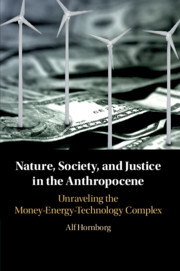Book contents
- Nature, Society, and Justice in the Anthropocene
- New Directions in Sustainability and Society
- Nature, Society, and Justice in the Anthropocene
- Copyright page
- Reviews
- Dedication
- Contents
- Figures
- Acknowledgments
- Introduction
- 1 Rethinking Economy and Technology
- 2 The Anthropocene Challenge to Our Worldview
- 3 Producing and Obscuring Global Injustices
- 4 The Money Game
- 5 Anticipating Degrowth
- 6 The Ontology of Technology
- 7 Energy Technologies as Time–Space Appropriation
- 8 Capitalism, Energy, and the Logic of Money
- 9 Unequal Exchange and Economic Value
- 10 Subjects versus Objects
- 11 Anthropocene Confusions
- 12 Animism, Relationism, and the Ontological Turn
- 13 Conclusions and Possibilities
- Afterword
- References
- Names Index
- Subject Index
2 - The Anthropocene Challenge to Our Worldview
Published online by Cambridge University Press: 24 June 2019
- Nature, Society, and Justice in the Anthropocene
- New Directions in Sustainability and Society
- Nature, Society, and Justice in the Anthropocene
- Copyright page
- Reviews
- Dedication
- Contents
- Figures
- Acknowledgments
- Introduction
- 1 Rethinking Economy and Technology
- 2 The Anthropocene Challenge to Our Worldview
- 3 Producing and Obscuring Global Injustices
- 4 The Money Game
- 5 Anticipating Degrowth
- 6 The Ontology of Technology
- 7 Energy Technologies as Time–Space Appropriation
- 8 Capitalism, Energy, and the Logic of Money
- 9 Unequal Exchange and Economic Value
- 10 Subjects versus Objects
- 11 Anthropocene Confusions
- 12 Animism, Relationism, and the Ontological Turn
- 13 Conclusions and Possibilities
- Afterword
- References
- Names Index
- Subject Index
Summary
The insight that human activity has been transforming the metabolism of the biosphere to such an extent that it threatens the future existence of our species has provoked several kinds of reactions among different people. In the two decades since the notion of the Anthropocene was introduced, at the start of this millennium (Crutzen and Stoermer 2000), it has generated a great number of books and articles discussing its various implications. Some writers have traced the history of debates regarding the naming and dating of this new geological age, referring to the research results of the Earth System sciences. Some have predicted the global environmental changes it is likely to imply over the coming decades and centuries, given different possible scenarios with regard to human economy, technology, and demography. Many have tried to identify the root causes of anthropogenic environmental degradation, offered political proposals for mitigating it, and deliberated on why such proposals are not being adopted. Others have suggested ways in which the concept of the Anthropocene should be changing mainstream understandings of the relation between nature and society, and of what it means to be human. Whether approaching the topic from the perspectives of natural science, social science, or the humanities, a great number of people concerned about our future have increasingly found their thinking framed in terms of the far-reaching implications of the Anthropocene.
- Type
- Chapter
- Information
- Nature, Society, and Justice in the AnthropoceneUnraveling the Money-Energy-Technology Complex, pp. 36 - 52Publisher: Cambridge University PressPrint publication year: 2019

